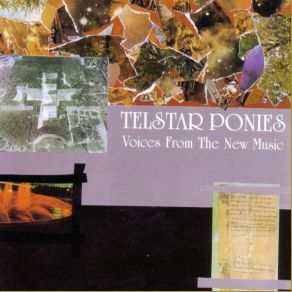Voices from the New Music
Download links and information about Voices from the New Music by Telstar Ponies. This album was released in 1997 and it belongs to Rock, Alternative genres. It contains 13 tracks with total duration of 01:16:41 minutes.

|
|
|---|---|
| Artist: | Telstar Ponies |
| Release date: | 1997 |
| Genre: | Rock, Alternative |
| Tracks: | 13 |
| Duration: | 01:16:41 |
| Buy it NOW at: | |
| Buy on iTunes $9.99 | |
Tracks
[Edit]| No. | Title | Length |
|---|---|---|
| 1. | Bells for Albert Ayler | 0:41 |
| 2. | Voices from the New Music | 4:05 |
| 3. | Last Outpost | 4:42 |
| 4. | Shizuka | 6:22 |
| 5. | A Little Cloud | 2:54 |
| 6. | Brewery of Eggshells | 5:26 |
| 7. | Aegis Falling | 5:50 |
| 8. | Sail Her On | 2:41 |
| 9. | A Feather On the Breath | 7:31 |
| 10. | The Fall of Little Summer | 7:17 |
| 11. | Does Your Heart Have Wings? | 13:01 |
| 12. | Song of Ansuz | 6:57 |
| 13. | La Vienna | 9:14 |
Details
[Edit]Scotland's Telstar Ponies never hit the ground running, despite the usual rapturous music-press buzz over their respective indie rock pedigrees. The band is mostly remembered as drummer Brendan O'Hare's next move after departing Teenage Fanclub's more power pop-oriented pastures, which are supplanted by a darker, almost claustrophobic sound. Telstar Ponies' freewheeling blend of deliberate tempos, paint-peeling guitar leads, and dreamy vocals naturally recall bygone New York art punkers like Television, or the Velvet Underground had they given their dronier side free rein. However, the atonal vocals and guitars preclude such easy pigeonholing; so do credits for "instruments" like bottle openers, buckets, hairbrushes, and tin cans. The best moments occur when the group cools their single-minded progressive ethic long enough to rock out; guitars squall to thunderous effect on "A Feather on the Breath" and the 13-minute epic "Does Your Heart Have Wings." Rachel Devine's swooning vocal delivery works to pin-drop intensity on such quieter tracks as the wistful "Song of Anusz." The music does exude a glossy confidence, although the group's cerebral stiffness seems best-suited for aspiring poets; the booklet credits scream of artsy conceit in quoting such disparate figures as Keiji Haro, Charles Mingus, and Thomas Wolfe. Guitar freaks will likely sift through the instrumental peaks and file the album away; so goes the '90s-era musical technocracy.